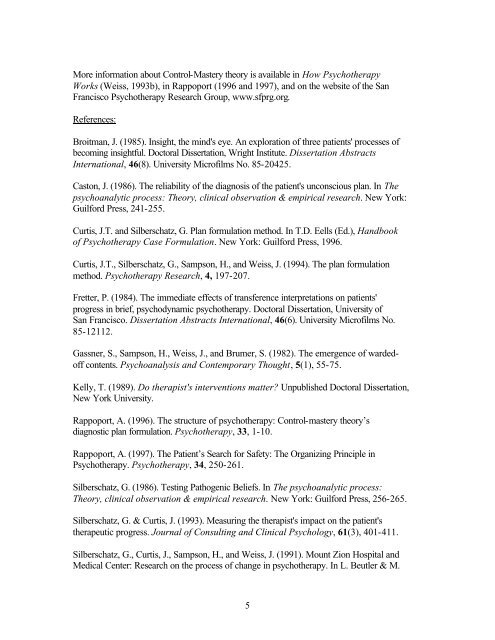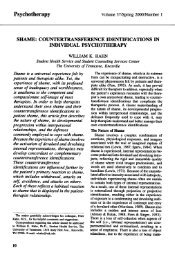Empirical SupportOver the past twenty years, the research group has produced a substantial body <strong>of</strong> workproviding empirical support for the theory. We have shown that independent raters canreliably agree on a patient’s plan (e.g., Caston, 1986; Curtis, Silberschatz, Sampson, andWeiss, 1994). We have demonstrated that test-passing can be empirically defined andreliably measured (e.g., Silberschatz in Weiss et al., 1986; Silberschatz & Curtis, 1993;Kelly, 1989). We have shown that test-passing predicts both immediate patient progressand outcome in psychotherapy (e.g., Fretter 1984). We have found that therapy eventsthat increase the patient’s sense <strong>of</strong> safety are typically followed by progress in therapy(e.g., Broitman, 1985, Gassner, Sampson, Weiss, and Brumer, 1982, Silberschatz, Curtis,Sampson, and Weiss, 1991). <strong>The</strong>re is a great deal <strong>of</strong> additional research supporting thetheory. More detailed discussions <strong>of</strong> the research and a bibliography can be found inWeiss, J., Sampson, H., and <strong>The</strong> Mount Zion <strong>Psychotherapy</strong> Research Group (1986), inWeiss (1993a), and on the research group’s website, www.sfprg.org.ConclusionOne advantage for the therapist in using the <strong>Control</strong>-<strong>Mastery</strong> approach is that it helps usto stay oriented in the treatment process. We can evaluate the appropriateness <strong>of</strong> ourinterventions by watching for signs <strong>of</strong> whether or not the patient feels safer after eachintervention. If the patient does feel safer, we can assume our intervention was helpful,and this gives us confidence in our understanding <strong>of</strong> the case and in our treatmentstrategy. If the patient does not seem to feel safer after our intervention, we should try tounderstand the reasons for his or her response, and change our tactics, and perhaps ourcase formulation, accordingly. A second benefit for the therapist <strong>of</strong> this approach is thathe or she is encouraged to participate fully in experiencing the relationship with thepatient, and to be authentic and expressive. This makes the experience <strong>of</strong> doing therapyinherently more rewarding for the therapist, and it benefits the patient because she or hecan more easily understand the therapist. <strong>The</strong> more transparent the therapist is, the morelikely the patient is to feel safe and free in the treatment process; the more enigmatic orauthoritarian the therapist is, the more defensive the patient is likely to feel.In sum, therapy is motivated and structured by the patient. <strong>The</strong> therapist does not choosethe goals <strong>of</strong> treatment nor the issues to be addressed. This is all done by the patient, bothconsciously and unconsciously. <strong>The</strong> therapist’s task is simply to understand what thepatient is working on, in what way the patient needs to feel safe with the therapist inorder to proceed, and to do his or her best to provide that safety. This way <strong>of</strong> doingtherapy is much easier and more enjoyable than one in which the therapist attempts to setthe goals and organize the process <strong>of</strong> treatment. In such circumstances the patient willstill try to accomplish his or her agenda, but the participants are more likely to be at crosspurposes, the process for both <strong>of</strong> them will be less straightforward and less enjoyable, andthe outcome is likely to be <strong>of</strong> less benefit to the patient.4
More information about <strong>Control</strong>-<strong>Mastery</strong> theory is available in <strong>How</strong> <strong>Psychotherapy</strong><strong>Works</strong> (Weiss, 1993b), in Rappoport (1996 and 1997), and on the website <strong>of</strong> the SanFrancisco <strong>Psychotherapy</strong> Research Group, www.sfprg.org.References:Broitman, J. (1985). Insight, the mind's eye. An exploration <strong>of</strong> three patients' processes <strong>of</strong>becoming insightful. Doctoral Dissertation, Wright Institute. Dissertation AbstractsInternational, 46(8). University Micr<strong>of</strong>ilms No. 85-20425.Caston, J. (1986). <strong>The</strong> reliability <strong>of</strong> the diagnosis <strong>of</strong> the patient's unconscious plan. In <strong>The</strong>psychoanalytic process: <strong>The</strong>ory, clinical observation & empirical research. New York:Guilford Press, 241-255.Curtis, J.T. and Silberschatz, G. Plan formulation method. In T.D. Eells (Ed.), Handbook<strong>of</strong> <strong>Psychotherapy</strong> Case Formulation. New York: Guilford Press, 1996.Curtis, J.T., Silberschatz, G., Sampson, H., and Weiss, J. (1994). <strong>The</strong> plan formulationmethod. <strong>Psychotherapy</strong> Research, 4, 197-207.Fretter, P. (1984). <strong>The</strong> immediate effects <strong>of</strong> transference interpretations on patients'progress in brief, psychodynamic psychotherapy. Doctoral Dissertation, University <strong>of</strong>San Francisco. Dissertation Abstracts International, 46(6). University Micr<strong>of</strong>ilms No.85-12112.Gassner, S., Sampson, H., Weiss, J., and Brumer, S. (1982). <strong>The</strong> emergence <strong>of</strong> warded<strong>of</strong>fcontents. Psychoanalysis and Contemporary Thought, 5(1), 55-75.Kelly, T. (1989). Do therapist's interventions matter? Unpublished Doctoral Dissertation,New York University.Rappoport, A. (1996). <strong>The</strong> structure <strong>of</strong> psychotherapy: <strong>Control</strong>-mastery theory’sdiagnostic plan formulation. <strong>Psychotherapy</strong>, 33, 1-10.Rappoport, A. (1997). <strong>The</strong> Patient’s Search for Safety: <strong>The</strong> Organizing Principle in<strong>Psychotherapy</strong>. <strong>Psychotherapy</strong>, 34, 250-261.Silberschatz, G. (1986). Testing Pathogenic Beliefs. In <strong>The</strong> psychoanalytic process:<strong>The</strong>ory, clinical observation & empirical research. New York: Guilford Press, 256-265.Silberschatz, G. & Curtis, J. (1993). Measuring the therapist's impact on the patient'stherapeutic progress. Journal <strong>of</strong> Consulting and Clinical Psychology, 61(3), 401-411.Silberschatz, G., Curtis, J., Sampson, H., and Weiss, J. (1991). Mount Zion Hospital andMedical Center: Research on the process <strong>of</strong> change in psychotherapy. In L. Beutler & M.5




